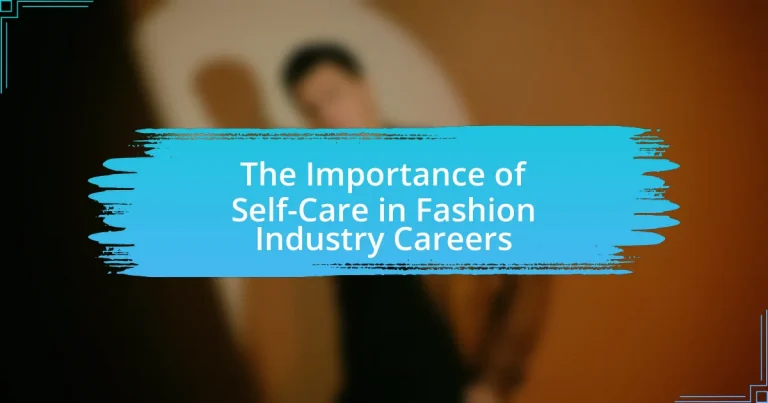The article emphasizes the critical role of self-care in fashion industry careers, highlighting its impact on creativity, productivity, and mental well-being. It discusses the unique stressors faced by fashion professionals, such as intense competition and tight deadlines, which can lead to burnout and decreased performance. The article outlines effective self-care strategies, including physical health practices, mental health prioritization, and setting professional boundaries, while also addressing the consequences of neglecting self-care, such as impaired job performance and strained personal relationships. Additionally, it provides practical tips for maintaining self-care amidst busy schedules and suggests resources available for fashion professionals seeking guidance on self-care practices.

What is the Importance of Self-Care in Fashion Industry Careers?
Self-care is crucial in fashion industry careers as it directly impacts creativity, productivity, and mental well-being. Professionals in this high-pressure environment often face long hours and intense competition, which can lead to burnout and decreased performance. Research indicates that regular self-care practices, such as mindfulness and physical activity, enhance cognitive function and emotional resilience, enabling individuals to maintain their creative edge and effectively manage stress. For instance, a study published in the Journal of Occupational Health Psychology found that employees who engage in self-care report higher job satisfaction and lower levels of anxiety, which is particularly relevant in the fast-paced fashion sector. Thus, prioritizing self-care not only fosters personal health but also contributes to sustained success in fashion careers.
Why is self-care crucial for professionals in the fashion industry?
Self-care is crucial for professionals in the fashion industry because it directly impacts their mental health, creativity, and overall productivity. The fast-paced and high-pressure environment of fashion can lead to burnout, anxiety, and stress-related disorders, which negatively affect performance. Research indicates that individuals in creative fields, including fashion, experience higher levels of stress, making self-care practices essential for maintaining well-being and fostering innovation. Prioritizing self-care allows fashion professionals to recharge, enhance their focus, and sustain their passion for their work, ultimately contributing to a more vibrant and sustainable industry.
What are the unique stressors faced by fashion industry professionals?
Fashion industry professionals face unique stressors such as intense competition, tight deadlines, and the pressure to constantly innovate. These stressors are exacerbated by the industry’s fast-paced nature, where trends change rapidly, requiring professionals to adapt quickly to remain relevant. Additionally, the expectation for perfection in design and presentation can lead to significant mental and emotional strain. According to a study published in the Journal of Fashion Marketing and Management, 70% of fashion professionals report high levels of stress related to job demands and work-life balance challenges, highlighting the need for effective self-care strategies to mitigate these pressures.
How does self-care mitigate these stressors?
Self-care mitigates stressors in the fashion industry by promoting mental and physical well-being, which enhances resilience against workplace pressures. Engaging in self-care activities, such as regular exercise, mindfulness practices, and adequate rest, has been shown to reduce anxiety and improve mood, thereby enabling individuals to cope better with the fast-paced and often high-stress environment of the fashion industry. Research indicates that self-care practices can lower cortisol levels, the hormone associated with stress, leading to improved overall health and productivity. For instance, a study published in the Journal of Occupational Health Psychology found that employees who practiced self-care reported lower levels of stress and higher job satisfaction, reinforcing the importance of self-care in managing the unique stressors faced in fashion careers.
What are the key components of effective self-care in fashion careers?
The key components of effective self-care in fashion careers include physical health, mental well-being, work-life balance, and professional boundaries. Physical health is crucial as it ensures stamina and energy, which are essential in a demanding industry; regular exercise and a balanced diet contribute to this aspect. Mental well-being is equally important, as high-stress environments can lead to burnout; practices such as mindfulness and therapy can support emotional resilience. Work-life balance is necessary to prevent overwork, with strategies like setting clear work hours and taking regular breaks being effective. Lastly, establishing professional boundaries helps maintain personal space and reduces stress, allowing individuals to thrive in their roles. These components are supported by studies indicating that self-care practices significantly enhance job satisfaction and productivity in high-pressure careers like fashion.
How can physical health practices enhance performance in fashion roles?
Physical health practices enhance performance in fashion roles by improving physical stamina, mental clarity, and overall well-being. Engaging in regular exercise, balanced nutrition, and adequate sleep contributes to higher energy levels, which are essential for the demanding nature of fashion work, including long hours and high-pressure environments. Research indicates that physical activity can increase cognitive function and reduce stress, leading to better decision-making and creativity, both crucial in fashion design and modeling. For instance, a study published in the Journal of Occupational Health Psychology found that employees who maintained regular physical activity reported lower levels of stress and higher job satisfaction, directly correlating to improved performance in their roles.
What role does mental health play in sustaining a fashion career?
Mental health is crucial for sustaining a fashion career as it directly impacts creativity, productivity, and overall job satisfaction. A positive mental state enhances an individual’s ability to innovate and adapt in a fast-paced industry, which is essential for success. Research indicates that mental health issues, such as anxiety and depression, can lead to decreased performance and increased absenteeism, negatively affecting career longevity. For instance, a study published in the Journal of Occupational Health Psychology found that employees with better mental health reported higher job performance and lower turnover intentions. Therefore, prioritizing mental health through self-care practices can significantly contribute to a sustainable and fulfilling career in fashion.
How does self-care influence creativity and productivity in fashion?
Self-care significantly enhances creativity and productivity in fashion by fostering mental clarity and emotional well-being. When fashion professionals engage in self-care practices, such as mindfulness, exercise, and adequate rest, they experience reduced stress levels, which directly correlates with improved cognitive function and innovative thinking. Research published in the Journal of Occupational Health Psychology indicates that employees who prioritize self-care report higher levels of job satisfaction and creativity, leading to more effective problem-solving and design processes in the fashion industry. Thus, self-care acts as a catalyst for both creative expression and productive output in fashion careers.
In what ways does self-care foster innovative thinking?
Self-care fosters innovative thinking by enhancing mental clarity and reducing stress, which are crucial for creativity. When individuals prioritize self-care, they experience improved cognitive function and emotional resilience, allowing them to approach problems with fresh perspectives. Research indicates that practices such as mindfulness and regular breaks can lead to increased divergent thinking, a key component of innovation. For instance, a study published in the Journal of Occupational Health Psychology found that employees who engaged in self-care activities reported higher levels of creativity and problem-solving abilities. This evidence supports the notion that self-care is not merely a personal benefit but a strategic advantage in fostering innovative thinking within the fashion industry.
How can self-care routines improve time management in fashion careers?
Self-care routines can significantly enhance time management in fashion careers by promoting mental clarity and reducing stress. When professionals in the fashion industry engage in self-care, they experience improved focus and productivity, which allows them to allocate their time more effectively. Research indicates that individuals who practice self-care report higher levels of job satisfaction and lower levels of burnout, leading to more efficient work habits. For instance, a study published in the Journal of Occupational Health Psychology found that employees who prioritize self-care are better at managing their workloads and meeting deadlines, ultimately benefiting their career progression in the fast-paced fashion environment.

What are the consequences of neglecting self-care in the fashion industry?
Neglecting self-care in the fashion industry leads to severe mental and physical health issues among professionals. The high-pressure environment, characterized by long hours and constant scrutiny, can result in burnout, anxiety, and depression. According to a study published in the Journal of Fashion Marketing and Management, 60% of fashion industry workers reported experiencing high levels of stress, which can lead to decreased productivity and creativity. Additionally, neglecting self-care can contribute to unhealthy lifestyle choices, such as poor eating habits and lack of exercise, further exacerbating health problems. This cycle of neglect ultimately affects not only individual well-being but also the overall success and sustainability of fashion businesses.
What are the potential risks of burnout for fashion professionals?
The potential risks of burnout for fashion professionals include decreased creativity, impaired decision-making, and increased mental health issues such as anxiety and depression. Fashion professionals often face high-pressure environments, tight deadlines, and constant demands for innovation, which can lead to chronic stress. Research indicates that prolonged exposure to such stressors can result in significant emotional exhaustion and detachment from work, ultimately diminishing job performance and satisfaction. A study published in the Journal of Occupational Health Psychology found that individuals experiencing burnout are 63% more likely to take sick leave, highlighting the tangible impact of burnout on professional responsibilities and overall well-being.
How does burnout affect job performance and career longevity?
Burnout significantly decreases job performance and shortens career longevity. Individuals experiencing burnout often exhibit reduced productivity, increased absenteeism, and a decline in the quality of work, which can lead to negative evaluations and potential job loss. Research indicates that approximately 76% of employees report experiencing burnout at some point, which correlates with a 63% increase in turnover intentions. This decline in performance not only affects immediate job responsibilities but also hampers long-term career growth, as persistent burnout can lead to disengagement from professional development opportunities and networking, ultimately limiting career advancement.
What signs indicate that a fashion professional is experiencing burnout?
Signs that indicate a fashion professional is experiencing burnout include chronic fatigue, decreased motivation, and a sense of detachment from work. Chronic fatigue manifests as persistent tiredness that does not improve with rest, while decreased motivation leads to a lack of enthusiasm for tasks that were once enjoyable. A sense of detachment often results in emotional numbness or cynicism towards colleagues and projects. Research by Maslach and Leiter highlights that these symptoms are common indicators of burnout across various professions, including fashion, emphasizing the need for self-care to mitigate these effects.
How does neglecting self-care impact personal relationships in the fashion industry?
Neglecting self-care significantly deteriorates personal relationships in the fashion industry by fostering stress and burnout among professionals. When individuals prioritize work over their well-being, they often become emotionally unavailable, leading to strained interactions with colleagues and loved ones. Research indicates that high-pressure environments, such as fashion, can exacerbate mental health issues, resulting in decreased empathy and communication skills. For instance, a study published in the Journal of Occupational Health Psychology found that employees experiencing burnout reported lower relationship satisfaction and increased conflict with peers. This decline in personal connections can ultimately hinder collaboration and creativity, essential components for success in the fashion industry.
What are the effects of work-life imbalance on personal connections?
Work-life imbalance negatively affects personal connections by reducing the quality and quantity of time spent with loved ones. Individuals experiencing this imbalance often prioritize work over relationships, leading to feelings of neglect and emotional distance. Research indicates that 70% of employees report that work demands interfere with their family life, resulting in increased stress and decreased relationship satisfaction. This imbalance can lead to conflicts, misunderstandings, and ultimately, weakened bonds with family and friends.
How can self-care improve interpersonal dynamics in a fashion career?
Self-care can significantly improve interpersonal dynamics in a fashion career by enhancing emotional well-being and reducing stress, which fosters better communication and collaboration among colleagues. When individuals prioritize self-care, they experience increased resilience and a more positive outlook, leading to healthier relationships in high-pressure environments typical of the fashion industry. Research indicates that employees who engage in self-care practices report higher job satisfaction and lower levels of conflict, which directly correlates with improved teamwork and creativity in collaborative projects. For instance, a study published in the Journal of Occupational Health Psychology found that self-care activities can lead to better emotional regulation, which is essential for maintaining constructive interactions in fast-paced settings like fashion shows or design teams.

What strategies can fashion professionals implement for effective self-care?
Fashion professionals can implement strategies such as setting boundaries, prioritizing mental health, and engaging in physical wellness activities for effective self-care. Setting boundaries involves defining work hours and personal time to prevent burnout, which is crucial in a high-pressure industry. Prioritizing mental health can include practices like mindfulness and seeking therapy, as studies show that mental well-being directly impacts creativity and productivity. Engaging in physical wellness activities, such as regular exercise and healthy eating, has been linked to improved mood and energy levels, essential for sustaining a demanding career in fashion.
What are some practical self-care tips for those in the fashion industry?
Practical self-care tips for those in the fashion industry include establishing a consistent sleep schedule, engaging in regular physical activity, and practicing mindfulness techniques. A consistent sleep schedule enhances cognitive function and creativity, which are crucial in fashion design and marketing. Regular physical activity, such as yoga or jogging, helps reduce stress and improve overall well-being, as supported by studies showing that exercise releases endorphins that combat anxiety. Mindfulness techniques, including meditation and deep-breathing exercises, can enhance focus and emotional resilience, which are essential in a fast-paced industry.
How can setting boundaries enhance self-care practices?
Setting boundaries enhances self-care practices by allowing individuals to prioritize their mental and emotional well-being. When professionals in the fashion industry establish clear limits on their time and energy, they reduce stress and prevent burnout, which is crucial in a high-pressure environment. Research indicates that individuals who set boundaries report higher levels of job satisfaction and lower levels of anxiety, as they can focus on their personal needs without feeling overwhelmed by external demands. This practice fosters a healthier work-life balance, enabling individuals to engage in self-care activities that rejuvenate them, ultimately leading to improved productivity and creativity in their careers.
What role does mindfulness play in self-care for fashion professionals?
Mindfulness plays a crucial role in self-care for fashion professionals by enhancing their ability to manage stress and maintain mental well-being. This practice allows individuals in the fast-paced fashion industry to cultivate awareness of their thoughts and feelings, leading to improved emotional regulation. Research indicates that mindfulness can reduce anxiety and increase resilience, which is essential for professionals facing high-pressure environments and tight deadlines. A study published in the Journal of Occupational Health Psychology found that mindfulness practices significantly decreased stress levels among workers, demonstrating its effectiveness in promoting mental health in demanding careers like fashion.
How can fashion companies support self-care among their employees?
Fashion companies can support self-care among their employees by implementing wellness programs that promote mental and physical health. These programs can include access to mental health resources, flexible work schedules, and initiatives that encourage work-life balance. Research indicates that companies with wellness programs see a 28% reduction in employee stress levels, which directly correlates to improved productivity and job satisfaction. By prioritizing self-care, fashion companies not only enhance employee well-being but also foster a more engaged and motivated workforce.
What initiatives can organizations implement to promote self-care?
Organizations can implement initiatives such as wellness programs, flexible work schedules, and mental health resources to promote self-care. Wellness programs can include activities like yoga, meditation sessions, and fitness challenges, which have been shown to reduce stress and improve overall well-being. Flexible work schedules allow employees to manage their time effectively, leading to a better work-life balance, which is crucial for self-care. Additionally, providing access to mental health resources, such as counseling services or workshops on stress management, supports employees in addressing their mental health needs. Research indicates that organizations prioritizing employee well-being see increased productivity and job satisfaction, reinforcing the importance of these initiatives in the fashion industry.
How can a supportive workplace culture enhance employee well-being?
A supportive workplace culture enhances employee well-being by fostering an environment of trust, collaboration, and open communication. This type of culture encourages employees to express their needs and concerns, leading to reduced stress and increased job satisfaction. Research from Gallup indicates that employees who feel supported by their workplace are 70% more engaged and report higher levels of well-being. Furthermore, a supportive culture can lead to lower turnover rates, as employees are more likely to remain in an environment where they feel valued and understood. This ultimately contributes to a healthier workforce, as employees experience less burnout and improved mental health.
What are the best practices for maintaining self-care in a fast-paced fashion environment?
To maintain self-care in a fast-paced fashion environment, individuals should prioritize time management, set boundaries, and engage in regular physical activity. Effective time management allows professionals to allocate specific periods for work and personal time, reducing stress and preventing burnout. Setting boundaries, such as limiting after-hours work communications, helps maintain a healthy work-life balance. Engaging in regular physical activity, supported by studies indicating that exercise reduces stress and improves mental health, is crucial for sustaining energy levels and overall well-being in a demanding industry.
How can professionals create a sustainable self-care routine amidst busy schedules?
Professionals can create a sustainable self-care routine amidst busy schedules by prioritizing time management and integrating self-care activities into their daily routines. Effective time management allows individuals to allocate specific time slots for self-care, ensuring that it becomes a non-negotiable part of their day. Research indicates that even short, consistent self-care practices, such as mindfulness or physical activity, can significantly enhance well-being and productivity. For instance, a study published in the Journal of Occupational Health Psychology found that employees who engaged in regular self-care reported lower stress levels and higher job satisfaction. By consciously scheduling self-care, professionals in the fashion industry can maintain their mental and physical health while managing demanding workloads.
What resources are available for fashion professionals seeking self-care guidance?
Fashion professionals seeking self-care guidance can access various resources, including online platforms, workshops, and mental health services. Websites like The Fashionista and Business of Fashion offer articles and insights on self-care tailored to the fashion industry. Additionally, organizations such as the Council of Fashion Designers of America (CFDA) provide workshops focused on mental health and wellness. Mental health apps like Headspace and Calm also cater to the unique stressors faced by fashion professionals, offering meditation and mindfulness exercises. These resources collectively support the mental well-being of individuals in the fashion sector, emphasizing the importance of self-care in maintaining a sustainable career.

















